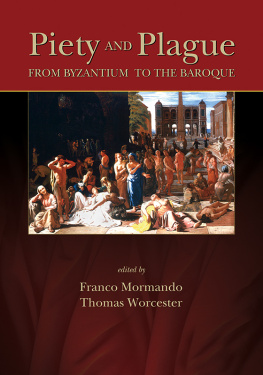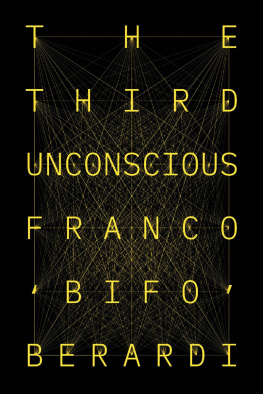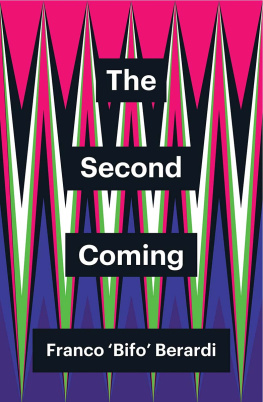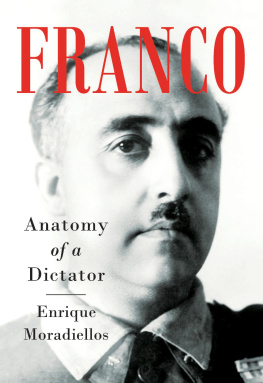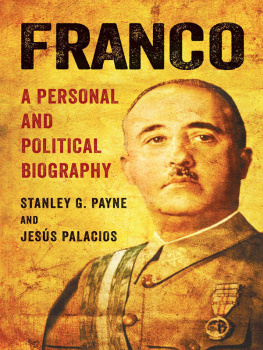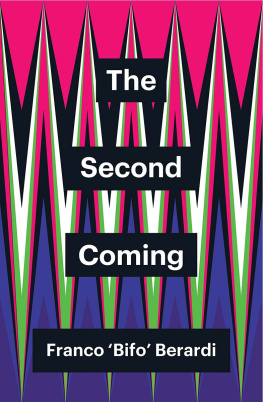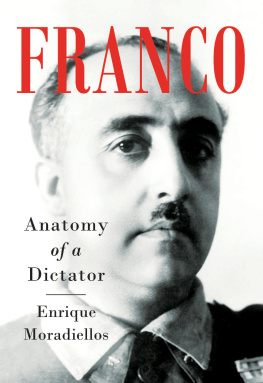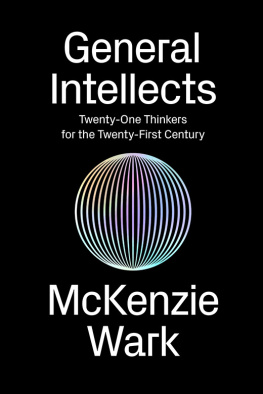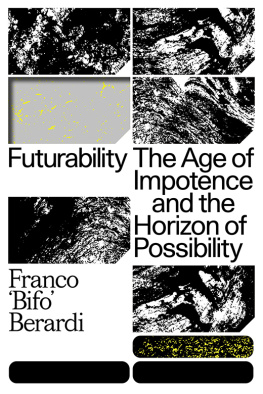
Edited by Gary Genosko and Nicholas Thoburn

Translated by Arianna Bove, Melinda Cooper, Erik Empson, Enrico,
Giuseppina Mecchia, and Tiziana Terranova
After the Future
By Franco Berardi
Edited by Gary Genosko and Nicholas Thoburn
2011 Franco Berardi
Preface 2011 Gary Genosko and Nicholas Thoburn
This edition 2011 AK Press (Edinburgh, Oakland, Baltimore)
ISBN-13: 978-1-84935-060-0
Library of Congress Control Number: 2011920477
AK Press | AK Press UK |
674-A 23rd Street | PO Box 12766 |
Oakland, CA 94612 | Edinburgh EH8 9YE |
USA | Scotland |
www.akpress.org | www.akuk.com |
The above addresses would be delighted to provide you with the latest AK Press distribution catalog, which features several thousand books, pamphlets, zines, audio and video recordings, and gear, all published or distributed by AK Press. Alternately, visit our websites to browse the catalog and find out the latest news from the world of anarchist publishing:
www.akpress.org | www.akuk.com
revolutionbythebook.akpress.org
Certified by the Forest Stewardship Council.
Cover by Margaret Killjoy | www.birdsbeforethestorm.net
Interior by Kate Khatib | www.manifestor.org/design
Page 16: Photograph by Ares Ferrari, licensed under the Creative Commons Attribution-Share Alike 3.0 Unported license.
Page 76: Photograph by The People Speak!, licensed under the Creative Commons Attribution 2.0 Generic license.
Page 128: Photograph by Mark Miller, licensed under the Creative Commons Attribution-Share Alike 2.0 Generic license. All other images public domain or unkown. All attempts have been made to contact the photographers or rights holders.
Portions of this book have appeared in different form in Precarious Rhapsody: Semiocapitalism and the Pathologies of Post-Alpha Generation (Minor Compositions, 2009) and The Soul at Work: From Alienation to Autonomy (Semiotext(e), 2009).
CONTENTS
Gary Genosko and Nicholas Thoburn
gary genosko and nicholas thoburn

WHAT HAPPENS to political thought, practice, and imagination when it loses hold on the future? It goes into crisis. The analytic, psychological, and libidinal structures of twentieth-century revolutionary politics were beholden to the temporal form of the futureit even gave the first movement of the avant-garde its name: Futurism. The future was on the side of the revolution. It was a great and empowering myth, but few believe it any longer: the future is over. Its last vestiges were squandered in the schemes of a heavily futurized financial capitalism.
This is Franco Berardis radical diagnosis. It is a clinical diagnosis as much as it is a political one, for Berardi traces the symptoms of the end of the future across the social and corporeal body. Cognitive, affective, linguistic, semiotic, desiring, economic, organizational, and mediatic processes are the matter of this assessment of the contemporary malaise. Symptoms point backwards to repressed contents, and lean into a postfuture that is still finding a way to coalesce. Such symptoms are not very enjoyable.
But the diagnosis is even more radical. The point isnt to revive the future in a new vanguard. The future was itself a highly suspect temporal formfor Berardi, the imaginary effect of the capitalist mode of production, with its expansive pursuit of surplus value. Things started to turn in 1977, the beginning of the progressive dissolution of the century that trusted in the future. It is here identified in British punk, but also in the Italian Movement of 77 that Berardi is so closely associated with.
Franco Berardi, or Bifo, is principally known to Anglo-American readers for his association with operaismo (workerism) and the movement of autonomia (autonomy). This current in Italian thought and extra-parliamentary politics came to prominence and considerable influence in the 1970s for its transformative approach to communist politicsplacing workers needs, desires, and organizational autonomies at the center of political praxisand for the wave of repression unleashed against it (Wright 2002). Since then, and under the rubric of postautonomism and postworkerismwhat Bifo prefers to call compositionismthis current has come to have considerable influence in activist circles, postmedia cultures, and the university. Antonio Negri is, of course, the principal figure here, but it would be a great mistake to take his work as an emblem for the historical forms and contemporary parameters of this mode of thought and politics as a whole.
A comrade of Negris in the key workerist organization, Potere Operaio, Bifos politics have continued to display the signs of the workerist current. This is not least in his insistence on engaging and researching the most contemporary technical and antagonistic composition of any class formation, never falling back on a preconstituted, identitarian understanding of political subjectivity. The deployment of the autonomist talisman of Marxs concept of the general intellect is perhaps the most enduring sign of this mode of intellectual commitment in his work. But Bifos relation to the critical current of operaismo is something of a zigzag, a transversal connection that is as much open to the outside of autonomist politics as it is an elaboration of it.
This is no more apparent than in the Bologna collective A/Traverso (In-between) that Bifo helped establish in the mid-1970s, and in the associated free radio station, Radio Alice. In these technocultural experiments in publishing, research, organization, and broadcasting, autonomist theses were enmeshed with pop-cultural styles, media capacities, the urban rebellions of proletarian youth, sexual politics, modernist poetics, and the conceptual innovations of poststructuralist thought, most especially those of Deleuze and Guattari. Shutdown by armed police for its contribution to the Bologna uprisings in the Spring of 1977, Radio Alice has taken on something of a mythic aspect, one confirmed in the highly evocative recent film about Radio Alice, Lavorare con lentezza, in which Bifo takes a cameo turn as a Marxist lawyer.
Bifos transversal politics, writing, and media practice have since developed through numerous organizational and media forms, as radio waves have been joined by digital technologies in the field of political compositionthe movement of community television, Telestreet, and the Web forum, Rekombinant, are notable instances. But returning to the themes of this book, how are Bifos arguments different or transversal to the positions that have come to be associated with postworkerism?
Bifos diagnosis is considerably darker than that of Hardt and Negri, as we can see with regard to the theme of immaterial labor. In the rise to prominence of the intellectual, semiotic, and affective content of work and its product, its now well known that Hardt and Negri detect a tendency toward workers autonomy, where capital becomes a parasitic agent of capture external to the self-organization of labor. Bifos conclusions are rather different. The agential force in contemporary configurations of work is not labor, but most decidedly
Next page



